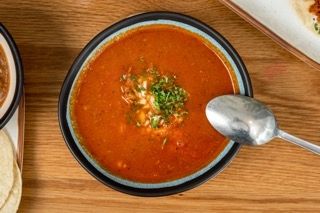Taste excellence in every dish served at New York Times rated establishments
Wiki Article
Is Mexican Food Healthy? Unboxing the Nutritional Benefits of Typical Components
The question of whether Mexican food is healthy and balanced welcomes an expedition of its traditional components. Beans and corn work as foundational staples, abundant in protein and fiber. Avocados give useful fats, while different natural herbs and flavors include flavor and wellness benefits - New York Times rated. Together, these parts create a tapestry of nourishment. Nevertheless, the healthfulness of Mexican cuisine often depends upon prep work methods and section sizes. What role do these variables play in establishing its overall dietary value?The Power of Beans: Protein and Fiber-Rich Staples
Frequently forgotten, beans offer as a foundation of Mexican food, providing a wide range of nutritional advantages. Rich in healthy protein, they are an exceptional plant-based alternative for those looking for to fulfill their dietary healthy protein requires. This high healthy protein material sustains muscle fixing and growth, making beans very useful for both vegetarians and meat-eaters alike. In addition, beans are an outstanding resource of nutritional fiber, which aids in digestion and advertises a sensation of fullness, potentially assisting with weight monitoring.The variety of beans utilized in Mexican recipes, such as black beans, pinto beans, and kidney beans, contributes to a diverse flavor account and can boost dishes nutritionally. Beans are low in fat and have crucial vitamins and minerals, consisting of folate, iron, and magnesium. Together, these features make beans a critical ingredient, delivering both nourishment and nourishment in traditional Mexican price.
Corn: a Versatile Grain With Nutritional Perks
Corn attracts attention as a flexible grain basic to Mexican cuisine, commemorated not just for its culinary applications yet also for its remarkable nutritional profile. As a main active ingredient in dishes like tortillas, tamales, and pozole, corn gives important nutrients that add to a balanced diet. Rich in carbs, it acts as a substantial energy source, while likewise being reduced in fat, making it a beneficial choice for numerous dietary needs.Corn is a great resource of nutritional fiber, which aids in digestion and advertises satiety. It includes substantial quantities of vitamins such as B-complex vitamins, which are important for basal metabolism. The presence of antioxidants, especially carotenoids, adds to total wellness by decreasing oxidative anxiety. In addition, corn is gluten-free, accommodating those with gluten sensitivities. In general, the dietary advantages of corn highlight its relevance in traditional Mexican food and its role in a healthy and balanced diet regimen.
Avocados: Healthy And Balanced Fats and Nutrients in Every Bite
Avocados play a considerable duty in Mexican food, matching meals with their velvety structure and abundant taste. Past their culinary appeal, avocados are celebrated for their outstanding nutritional profile. They are an abundant resource of healthy and balanced monounsaturated fats, which can aid reduced poor cholesterol levels and support heart health. In addition, avocados are loaded with necessary nutrients, consisting of potassium, vitamin E, and B vitamins, adding to overall wellness.The high fiber web content in avocados help digestion and promotes satiation, making them a beneficial enhancement to any kind of dish. Their special nutrient structure can likewise support skin health and wellness and supply anti-inflammatory benefits. Integrating avocados into standard Mexican meals or appreciating them as a standalone snack can improve both taste and nourishment, demonstrating why they are a cherished staple in Mexican cuisine. On the whole, avocados use a tasty method to delight in healthy fats and important nutrients in every bite.

Herbs and flavors: Flavorful Health Boosters
While taking pleasure in the abundant flavors of Mexican food, one can not overlook the vital duty that spices and herbs play in improving both preference and health. Components such as cilantro, oregano, and chili peppers not only add to the vibrant flavor account but likewise give considerable health benefits. For example, cilantro is known for its detoxing buildings, assisting to eliminate hefty metals from the body, while oregano is packed with anti-oxidants and has anti-inflammatory effects.Chili peppers, a staple in many Mexican dishes, include capsaicin, which has hong kong chinese food actually been connected to improved metabolism and pain relief. In addition, spices like cumin and coriander support food digestion and might aid in blood sugar policy. Including these flavorful health boosters into dishes not only improves the culinary experience yet also promotes overall wellness, making Mexican cuisine not simply scrumptious, yet likewise nutritionally beneficial.
Traditional Food Preparation Techniques: Enhancing Nutrition and Flavor
Traditional food preparation techniques in Mexican cuisine play a vital role in enhancing both nourishment and taste, as they usually focus on fresh components and time-honored techniques. Techniques such as nixtamalization, where corn is saturated and prepared in an alkaline solution, not only boost the nutrient profile of tortillas but additionally enhance their digestibility - freshly made guacamole. get redirected here In addition, the usage of slow food preparation methods, like cooking or braising, enables flavors to fuse beautifully while maintaining the integrity of the active ingredients
Frequently Asked Questions
Are Mexican Food Portions Usually Larger Than Other Foods?
Mexican food sections are usually bigger than those of lots of various other foods. This particular shows conventional dining practices, stressing public sharing and hearty dishes, which can bring about an extra significant offering dimension generally.
Just how Does the Preparation Method Affect Healthiness of Mexican Food?
Preparation techniques considerably affect the healthiness of Mexican food. Strategies such as barbecuing or steaming maintain nutrients, while frying can boost unhealthy fat web content. Choices of active ingredients and cooking styles ultimately determine general dietary worth.Can Mexican Food Be Customized for Certain Dietary Limitations?
Mexican food can without a doubt be tailored for certain dietary limitations. Substitutions, such as utilizing corn tortillas for you could try these out gluten-free diets or including more vegetables, make it possible for individuals to take pleasure in traditional flavors while suiting various dietary demands.What Are Common Misconceptions Regarding Mexican Food and Health And Wellness?
Typical false impressions about Mexican food include the idea that it is naturally unhealthy, excessively zesty, and solely focused on fats. In truth, typical dishes commonly feature nutritious components and can be customized to numerous nutritional needs.Are There Healthier Choices at Mexican Dining Establishments?
Much healthier alternatives at Mexican restaurants typically consist of smoked meats, beans, and fresh veggies. Choosing dishes that highlight entire ingredients and preventing heavy sauces can cause an extra healthy eating experience, promoting general health.The variety of beans utilized in Mexican recipes, such as black beans, pinto beans, and kidney beans, contributes to a diverse taste profile and can improve dishes nutritionally. Avocados play a significant role in Mexican cuisine, matching meals with their luscious appearance and rich flavor. Integrating avocados right into standard Mexican recipes or appreciating them as a standalone treat can boost both taste and nourishment, showing why they are a cherished staple in Mexican food. While appreciating the abundant tastes of Mexican food, one can not ignore the crucial duty that spices and natural herbs play in improving both preference and health and wellness. Standard food preparation techniques in Mexican cuisine play an important role in boosting both nutrition and taste, as they usually focus on classic strategies and fresh active ingredients.
Report this wiki page